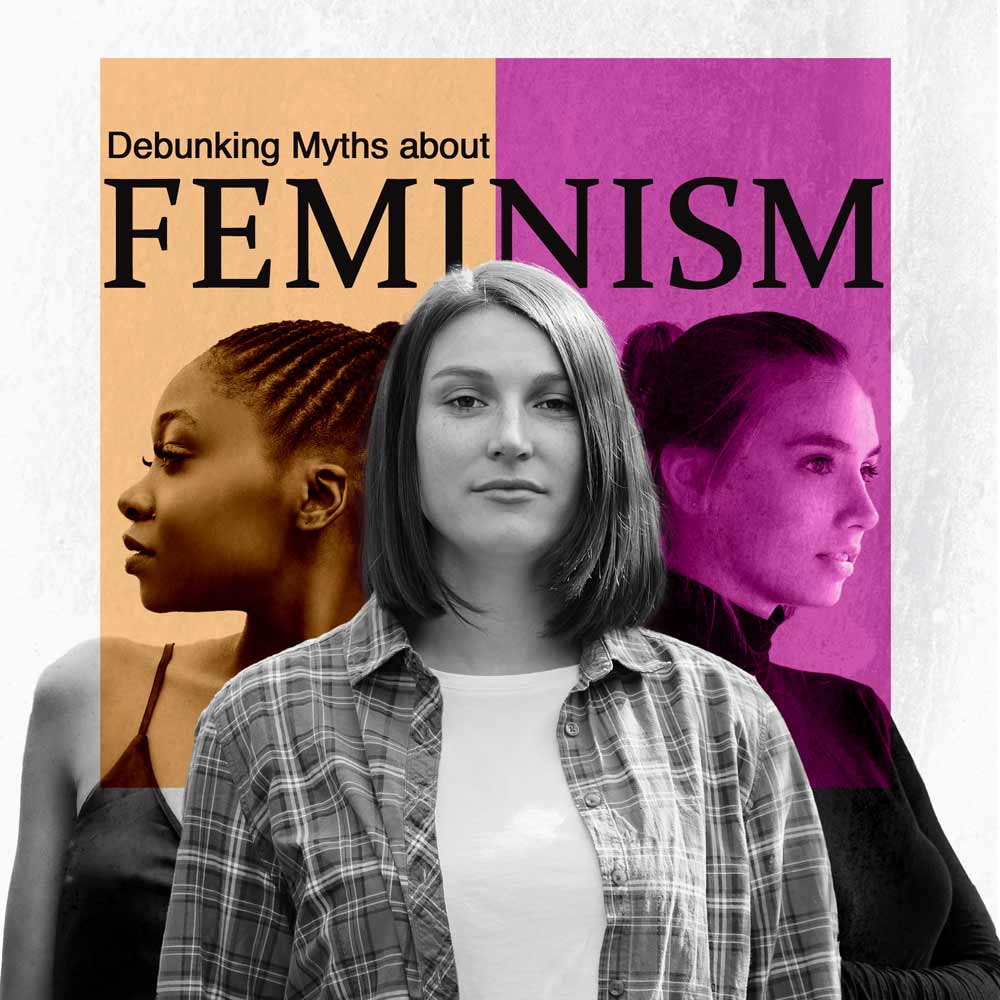Overview:
Feminism as a concept is not new, and neither are the mistaken beliefs about what feminism means.
The Evolution of Feminism
The idea of feminism pushes people to question and challenge inequalities. Although the meaning is quite straightforward, the movement of feminism is often polluted by misconceptions.
The word was introduced in the 19th century, by French socialist Charles Fourier, who used the French word féminisme to describe his vision of the emancipation of women. Over time, as women’s roles have evolved in the world, so, too, has the meaning of the word feminism. Unfortunately, even as feminism itself has progressed in a positive fashion, bringing about great change and awareness, the words feminism and feminist have developed negative connotations. This negativity contributes to the denigration of generations of advancement and has brought about a push to avoid all use of these terms.
To forward as a society that truly embraces gender equality, we must begin by dispelling the often-misbegotten myths surrounding it.

Debunking Myths
Myth: Feminism is counter to femininity
Truth: The idea that feminists are anti-feminine is as outdated as the bra-burning demonstrations of the 1960s. Feminism encourages equality and independence, especially women’s freedom to make their own choices. This means women should have the leeway to decide whether to present themselves as feminine, masculine, or anything in between. Feminists run the gamut of femininity, gender, and sexuality and take issue with someone’s self-representation only when it is done to please others or fulfill another person’s expectations, rather than reflecting one’s own choices.
Myth: Feminists hate men
Truth: Once upon a time, feminists were portrayed as angry women who blamed men for everything wrong in the world. In reality, hatred toward men is antithetical to feminist beliefs. Feminism promotes equality between sexes and genders, making hatred toward any particular group contradictory. Feminism strives to eradicate hatred and inequality, not propagate them. In fact, feminism calls upon men to support the cause.

Myth: Feminists make an issue out of everything
Truth: In reality, feminists make an issue only of things that promote inequality, mistreatment, or misrepresentation of women. Issues that feminists have addressed throughout history include voting rights, equal employment opportunities, pay gaps, domestic violence, sex trafficking, sexual harassment, body shaming, and poor representation in government. Feminists voice opinions about things that others might ignore but are reflective of systematic sexism in the society. These issues are by no means representative of all the problems present in the world today, but they do raise important human issues that we should all be concerned with.
Myth: Feminism conflicts with religious values
Truth: Nothing about feminism discourages women from embracing their religion or concept of God. While some religions do have patriarchal interpretations and a long-standing history of discriminating against women, religion is not inherently sexist. Within this context, the only push is for women to be heard and to have a say in how religious values and practices are interpreted.
Just as men have made laws governing women and their rights, men have often interpreted religious doctrines, which has led to biased interpretations in men’s favor. Rather than shunning religion, feminists want to have a say in this process to ensure equal representation and fair treatment from their chosen faith.

Myth: Feminism champions career focus and discounts women as homemakers
Truth: Feminism’s goal is to promote women’s equality and independence, which boils down to simply empowering women to be able to live the lives they wish to live—and to do so on their own terms. Many women today elect to marry and have families, and many of those women choose to stay home to raise their children, rather than entering or remaining in the workforce. When such choices are made by women of their own free will and based on how they wish to live their life, that is true feminism. When women are not given the choice or opportunity to decide for themselves, feminism is defeated.
Myth: Feminists are angry, bitter people
Truth: Anger is not a pillar of feminism, nor is it a defining characteristic of feminists. Anger is a human emotion that stems from an internal reaction to a real or perceived wrongdoing, hurt, provocation, or threat. Women have historically been marginalized, so their anger in response to inequality is understandable as a natural emotional reaction to unfair treatment. However, is that feminists do not simply live their lives in anger but use their outrage as a mechanism to spark change in the world. Anger is a powerful tool, and when people get angry, they make noise. When noise is loud enough, necessary change follows. If men can use their anger to make noise that changes the world, women should be entitled to do the same without being unjustly labeled.

Myth: Male feminists are acting against their own gender
Truth: The objective of feminism is not to pit men against women, or vice versa, but to achieve fairness and equality among genders. The movement is not about men against women, it’s patriarchy against the people. By supporting equality, feminist men are fighting for what is right, not to discredit or constrain their own gender. Notably, men also experience marginalization from the patriarchy. Their fight for equality is therefore against all who discriminate, not explicitly against the male gender.
Feminism is a beautiful word. As with any movement, there is a small section of “feminists” who portray it as a man-hating ideology. Yet, the whole movement cannot be defined by only a small fraction of its members. In reality, feminists have no agenda other than creating a world which is equitable, fair, and just for all. If everyone had a clear understanding of the word, the debates surrounding the definition would be directed where they belong – towards ending sexism.
We are building a haven for vocal activists who want to create impact and bring change. We know that together we will lift the hood of false allegation through the power of education. Join revolution!
Originally Published by Timeascent
Conclusion:
We are building a haven for vocal activists who want to create impact and bring change. We know that together we will lift the hood of false allegation through the power of education. Join the revolution!


